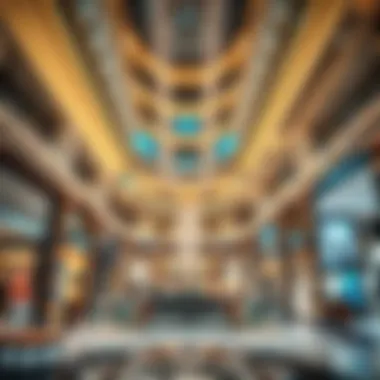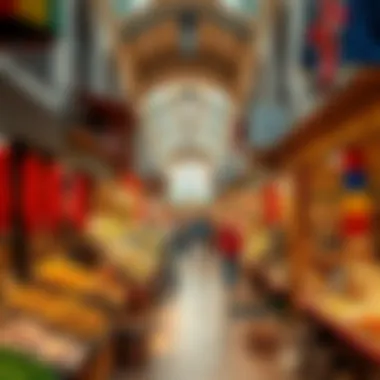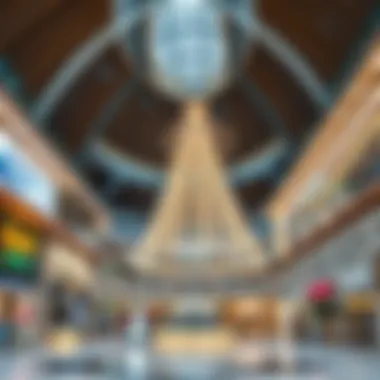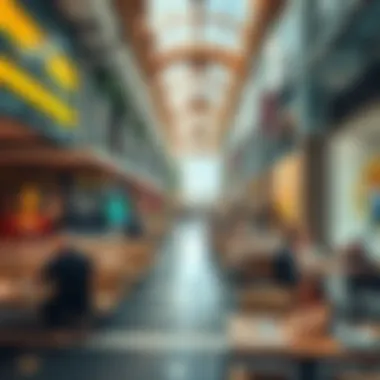Shopping Complexes in Dubai: A Comprehensive Guide


Intro
Dubai is not just a city of skyscrapers and glitzy hotels; it's a hub of shopping experiences that cater to a wide array of tastes and preferences. From the opulent malls that dot the skyline to the traditional souks teeming with local goods, shopping in Dubai is nothing short of an adventure. The diverse shopping complexes offer a unique glimpse into the culture and lifestyle of this vibrant Emirate.
As consumers increasingly seek both practicality and experience, the shopping landscape has evolved significantly. Each shopping complex tells its own story through its architectural design, the brands it houses, and the services it provides. This guide is intended to offer you a comprehensive overview of the shopping scene in Dubai, presenting you insights into major malls, hidden gems, and local markets that together form the retail tapestry of the city.
Moreover, while our focus is on shopping, we won't overlook the essential aspects of accessibility and entertainment options that enhance the overall shopping experience. Whether you're a visitor looking to soak in the atmosphere, or a resident aiming to navigate the unique retail offerings, this guide is crafted to equip you with all the necessary information.
With that backdrop, let’s dive into the heart of the matter.
Market Insights
Current Trends in Dubai Real Estate
The retail real estate market in Dubai is continuously evolving, influenced by a variety of factors, including economic shifts, consumer preferences, and technological advancements. Recently, a trend has emerged where large malls are not just spaces for shopping but also entertainment hubs. Families and young adults are increasingly drawn to venues that offer more than just retail options. Consequently, developers are investing vigorously in creating multifaceted environments that include entertainment complexes, fitness centers, and cultural spaces.
"Shopping today isn't just about buying goods; it's an experience. Malls are evolving into lifestyle destinations."
Another key trend is the rise of e-commerce, which has led traditional retail spaces to rethink their strategies. Brick-and-mortar stores are beginning to embrace tech innovations to enhance the in-store experience, from augmented reality to mobile payment systems. This fusion of technology and retail not only meets the demands of tech-savvy consumers but also aids retailers in managing inventory smarter.
Emerging Areas and Investment Hotspots
As Dubai expands and develops on all fronts, certain districts have emerged as hotspots for shopping and further investment. Areas like Dubai Marina and Downtown Dubai have taken the limelight, featuring glamorous malls like The Dubai Mall and Marina Mall, known for their luxurious offerings and stunning architecture.
However, it's the lesser-known areas that are quickly gaining traction among shoppers and investors alike. Locations such as Al Quoz and Jumeirah Lakes Towers (JLT) are evolving with up-and-coming shopping complexes that appeal to a younger demographic.
Here's a breakdown of some of these emerging areas:
- Al Quoz: Known for its art galleries, this district is becoming home to quirky shops and independent boutiques.
- Dubai Design District (d3): A hub for creativity, it features retail spaces that cater to fashion-forward consumers.
- Riyadh Street in Al Barsha: This area is filled with a mix of local and international retail brands, becoming a favorite for shoppers seeking diversity.
Prelims to Shopping in Dubai
Shopping in Dubai goes beyond mere retail; it is a vibrant experience intertwined with the city's culture and innovation. This metropolitan hub is renowned for its towering skyscrapers and luxury lifestyle, but what really brings people to its heart is the shopping scene that has evolved immensely over the years. From high-end international brands to traditional markets, Dubai offers a retail landscape that caters to every taste and budget.
One might wonder, why should shopping hold such importance in Dubai? The answer lies in the city's growth trajectory. Shopping complexes act as more than just places to buy goods. They serve as social spaces, cultural hubs, and entertainment centers that attract both locals and tourists alike. Malls are sprawling with diverse attractions, while traditional souks hold historical charm with their unique offerings.
Not only do these places facilitate commerce, but they also contribute significantly to the local economy, create jobs, and bolster tourism. With expatriates making up a large portion of the population, the demand for varied retail options has surged, leading to new trends and concepts within the shopping scene.
Therefore, understanding the nuances of shopping in Dubai is pivotal for real estate investors, expatriates, and homebuyers looking to understand the lifestyle of the city. The retail environment reflects broader economic trends, and a keen insight into this area can influence investment decisions and living experiences. This guide will navigate you through the essential aspects of shopping in Dubai, enlightening you on its unique characteristics, historical context, and the major complexes that dot the skyline.
"Shopping in Dubai is not just a pastime; it's an adventure waiting to unfold at every corner."
In this article, we'll delve into the historical evolution of shopping centers, major malls, local markets, current retail trends, and much more. By the time you finish reading, you'll have a comprehensive understanding of why shopping in Dubai is much more than a simple transaction; it's a lively experience intertwined with the very fabric of the city.
Historical Context of Shopping Centers
Understanding the historical backdrop of shopping centers in Dubai is essential for grasping their evolution into the vibrant hubs they are today. The transformation of shopping practices in Dubai reflects broader changes in society, economy, and culture. This section sheds light on the roots and growth of these markets, enabling both residents and expatriates to appreciate the significance of the city's retail landscape.
Evolution of Retail Markets
The retail scene in Dubai has undergone remarkable changes over the decades. Prior to the 1990s, shopping was largely limited to local souks and small stores. The arrival of globalization brought modern shopping experiences to the forefront. The inception of traditional markets, like the Gold Souk, laid the foundation for the larger shopping complexes that characterize Dubai today.
In the early 2000s, the landscape shifted further with the introduction of mega malls, blending international retail brands with local culture. Malls such as The Dubai Mall and Mall of the Emirates emerged as monolithic spaces where shopping, leisure, and entertainment collide. This evolution not only reflects changing consumer preferences but also illustrates Dubai's ambition to position itself as a global shopping destination.
Moreover, advancements in technology have accelerated this evolution. The rise of e-commerce has changed how consumers shop, influencing traditional retail dynamics. Now, shoppers have a choice to experience the bustling atmosphere of malls or shop conveniently from their devices. This duality adds layers to Dubai's retail market, making it not just a place to shop, but a multifaceted experience that intertwines with lifestyle, leisure, and social engagement.
Impact of Culture on Shopping Practices
Culture plays a pivotal role in shaping shopping practices in Dubai. The city's unique blend of traditions and modernity is reflected in the way shopping occurs, highlighting the interaction between visitors and locals. The traditional souks offer a glimpse of the heritage and craftsmanship of the region, showcasing everything from spices to textiles.
On the flip side, the luxurious malls cater to a diverse demographic, bringing together international influences and local tastes. Shopping has become not only a transaction but a social activity, where families gather, friends meet, and memories are created. The layout of malls encourages this interaction, with social spaces such as cafes, play areas, and cinemas nestled within retail corridors.
"Dubai's shopping practices aren't just about buying; they're about experiencing the culture in every transaction."
As Dubai continues to evolve, the retention of cultural identity within the commercial sphere remains vital. Festivals and events, such as the Dubai Shopping Festival, highlight the city's commitment to celebrating both its local and cosmopolitan aspects, augmenting the shopping experience.
For further exploration of retail developments in Dubai, consider reputable resources such as Dubai Tourism and Dubai Retail.
Major Shopping Malls in Dubai


The shopping malls in Dubai are often the beating heart of the city, merging consumer experiences with extravagant designs and cultural nuances. These malls are not merely places to shop; they are venues for social gatherings, family outings, and entertainment. Highlighting what makes these spaces stand out can provide visitors and residents alike with a vivid picture of modern retail culture in one of the region's most dynamic cities.
The Dubai Mall: A Flagship Retail Destination
Key Features
The Dubai Mall is often regarded as a flagship destination, offering more than 1,200 retail outlets that cover an extensive range of international brands. This creates a shopping experience that attracts millions of visitors each year.
One standout characteristic is its sheer size; covering 1.1 million square meters, it’s a vast labyrinth of shops, dining, and entertainment options. This makes it a popular choice because of the variety it provides. For example, shoppers can find everything from high-street fashion to luxury brands, all under one roof.
A unique feature is the mall’s integration with the Burj Khalifa, which adds a distinct flair to the shopping experience. This proximity allows visitors to enjoy spectacular views from the observation deck after an extensive shopping spree, enhancing the overall appeal of the mall. However, the vastness can sometimes be daunting for first-time visitors, contributing to potential frustration in navigation.
Visitor Experience
The visitor experience at The Dubai Mall can be likened to stepping into an entertainment wonderland. Besides shopping, the mall offers attractions such as an aquarium, an ice rink, and a virtual reality park, catering to diverse interests.
The key element here is the mix of shopping and entertainment, making it a family-friendly destination. For example, children can enjoy the KidZania, an interactive learning environment, while adults explore contemporary art installations. However, the foot traffic can be overwhelming during weekends, which may lessen comfort.
Architectural Highlights
Architecturally, The Dubai Mall is a masterpiece. Its semi-modern design contrasts sharply with the surrounding skyline, beautifully blending with the Burj Khalifa and the Dubai Fountain. This architectural harmony is crucial for establishing a visual identity that resonates globally.
One unique feature of its design is the impressive glass panels that allow natural light to flood the mall, creating a vibrant atmosphere. This is a beneficial aspect as it promotes energy efficiency while maintaining a lively shopping space. Yet, this design also means that during peak hours, the natural lighting causes glare, which can be distracting for visitors.
Mall of the Emirates: Luxury and Leisure Combined
Retail Offerings
Mall of the Emirates is distinguished by its broad retail offerings that cater to a wealthier clientele. With over 630 stores, this shopping mall features many luxury brands, from Gucci to Prada, making it a hot spot for serious shoppers.
The highlight here is undoubtedly the variety of exclusive outlets not found in many other malls, which elevates shopping here to an indulgent experience. One unique aspect is its dedicated area for high-end fashion, which sets it apart as a luxury shopping destination. However, the premium pricing can be unaffordable for some.
Entertainment Options
Entertainment at the Mall of the Emirates takes many forms, from cinemas to various dining options that enhance the overall shopping experience. The mall hosts a Cineworld multiplex that features both mainstream and independent films, providing choice for all ages.
The key feature of its entertainment offerings is the diverse range of cuisines available, encompassing everything from Middle Eastern dishes to international gourmet selections. This variety attracts food enthusiasts, making it a favorable choice for those looking to enjoy a meal after shopping. That said, peak dining hours can lead to longer wait times, which might test the patience of hungry shoppers.
Ski Dubai
One of the most distinctive attractions of the Mall of the Emirates is Ski Dubai, an indoor ski resort offering a unique experience in the desert heat. This facility features real snow, ski slopes, and even a snow park, distinguishing it as an entertainment landmark in Dubai.
Its characteristic is that it allows visitors to engage in winter sports, which is a rare find in this part of the world. Families can enjoy activities like tobogganing and snowman-building, providing an exceptional contrast to the sweltering heat outside. However, entering Ski Dubai requires an additional ticket purchase, which some may find a bit steep compared to typical mall experiences.
"Shopping at Dubai's malls is more than just a financial exchange; it’s an experience echoing the city’s cultural heartbeat in every store and corner."
Every shopping mall in Dubai offers a glimpse into the city’s culture and lifestyle, transforming an ordinary trip to the mall into a memorable adventure.
Local Markets and Souks
Local markets and souks in Dubai are more than just shopping destinations; they are vibrant hubs of cultural exchange and community engagement. These markets offer a unique blend of traditional and contemporary shopping experiences, showcasing the rich history and diverse culture of the region. They stand in stark contrast to the modern shopping malls that dominate the Dubai landscape, providing visitors a chance to engage with local artisans, taste traditional flavors, and buy handcrafted goods. This section explores the traditional souks and emerging local markets, emphasizing their significance and appeal.
Dubai’s Traditional Souks: A Cultural Experience
Gold Souk
The Gold Souk is a dazzling spectacle, a place where the brilliance of gold jewelry showcases the craftsmanship of skilled artisans. This market, located in the heart of Dubai's old trading district, features a myriad of shops, each displaying intricate gold pieces ranging from simple bands to elaborate necklaces.
The key characteristic of the Gold Souk is its extensive variety of options. Customers can browse through an astonishing range of designs, making it a popular choice for both locals and tourists. The allure of purchasing gold at competitive prices adds to its attractiveness, making it a go-to for those looking to invest in precious metals.
One unique feature of the Gold Souk is the custom-made jewelry service. Shoppers can choose their design and have a piece crafted on-site, ensuring a personal touch that is hard to find in mass-produced malls. However, buyers should be cautious, as some shops may have different pricing structures depending on the quality of the gold and design intricacy.
Spice Souk
The Spice Souk complements the Gold Souk, offering an entirely different sensory experience. The air is permeated with rich aromas of spices, herbs, and dried fruits. This market is a sensory delight, making it a beneficial choice for those who wish to dive into culinary traditions of the region.
The key characteristic of the Spice Souk is its diverse selection of spices, where one can find everything from saffron to za'atar. Each stall brims with colorful displays, enticing visitors to explore different flavors. An advantage of shopping here is the ability to purchase spices in bulk, which often comes at lower prices than in grocery stores.
However, the bustling nature of the souk can be overwhelming for first-time visitors. It's important to bargain wisely and to ask for tasting options before making any purchases.
Textile Souk


The Textile Souk offers a rich tapestry of colors and fabrics, making it a must-visit for those interested in textiles and fashion. Located near the Dubai Creek, this marketplace presents a diverse array of materials, including silks, cottons, and embroidered fabrics.
The Textile Souk stands out due to its unique character; it allows visitors to experience the artistry of various weaving techniques from the region. Shopping here is popular among those looking for traditional attire such as abayas or kaftans, along with custom tailoring services available from many shops.
A notable advantage of the Textile Souk is its affordability, as consumers often find better deals for unique items than in upscale boutiques. One consideration, though, is that it might take time to navigate through the myriad of options available, though this can also be part of the fun.
Emerging Local Markets
Emerging local markets have begun to redefine the shopping experience in Dubai, reflecting the city's ever-evolving identity. These markets focus heavily on community engagement and support for local artisans, making them increasingly popular among residents and expatriates.
Artisan Markets
Artisan markets showcase the talents of local craftspeople, offering everything from handmade jewelry to organic skincare products. These markets often set up in parks and community spaces, creating a more relaxed shopping environment compared to traditional malls.
The key characteristic of artisan markets is their emphasis on sustainability. They often feature eco-friendly products that cater to environmentally conscious consumers, making it a beneficial stop for those seeking quality items with minimal environmental impact. Furthermore, it allows shoppers to connect with the makers, providing a story behind each purchase.
However, while these markets are great for unique finds, their schedules can be inconsistent, often dependant on seasonal considerations or special events.
Pop-Up Shops
Pop-up shops have become a trendy way for brands and designers to interact with consumers in Dubai. These temporary retail spaces can appear anywhere from high streets to beaches, providing a fresh shopping experience each time they emerge.
The key characteristic of pop-up shops is their limited-time nature, which creates a sense of urgency for shoppers. They often feature exclusive collections not found elsewhere, making them an appealing choice for fashion-forward consumers. Additionally, pop-ups can offer a more personalized shopping experience, as they tend to focus on customer engagement.
Nevertheless, the fast-paced nature of these establishments can mean that shoppers miss out on their favorite items if they're not quick enough.
Community Events
Community events are cropping up around Dubai, making shopping a more interactive experience. These can include markets that celebrate local artisans or food festivals that promote regional cuisines.
The key characteristic of community events is their ability to foster connections between people. They serve not only as a marketplace but also as a social gathering point, enhancing the sense of community within diverse groups. These events often introduce new vendors and fresh concepts to the public, expanding the shopping experience into a cultural one.
While these gatherings provide an exciting opportunity, they may require planning in advance, as they often happen on specific days and can draw large crowds.
Retail Trends in Dubai
Understanding retail trends in Dubai is crucial for anyone navigating this vibrant shopping landscape. The city is not just a hub for extravagant malls and local souks; it’s also a reflection of evolving consumer behaviors and technological advancements. This section will explore how these trends shape the shopping experience and influence business strategies in the emirate.
The Rise of E-commerce
E-commerce has gained a formidable foothold in Dubai, spurred by advancements in technology and shifts in consumer preferences. More people are drawn to the convenience of shopping online, particularly amidst their busy lifestyles. The surge in home delivery services and mobile shopping apps has transformed how residents and tourists make purchases.
The growth of platforms like noon.com and souq.com highlights this trend. These online marketplaces offer extensive product ranges and often provide competitive pricing and promotions. Furthermore, mobile optimization has become pivotal, as many users prefer shopping via smartphones.
Several factors account for this rapid rise in e-commerce:
- Convenience: Customers can browse and shop at their leisure, without the constraints of mall hours.
- Variety: Online stores often showcase a broader range of products compared to physical stores.
- Price Comparison: Shoppers can easily compare prices across various platforms, finding the best deals.
However, e-commerce isn't without challenges. Local retailers must adapt to this trend by enhancing their online presence. This shift forces businesses to consider customer experience continually. In addition, there are discussions about regulations that may affect the e-commerce landscape, something potential investors should watch closely.
"The rapid growth of e-commerce in Dubai reflects a global shift, but one must consider regional nuances that affect buying behavior."
Sustainability in Retail
Increasingly, sustainability stands as a pillar in Dubai's retail environment. As awareness about environmental issues rises, consumers are becoming more scrutinizing of their purchases. Brands focusing on sustainable practices not only attract a conscientious customer base but also contribute positively to their brand image.
Several initiatives in Dubai illustrate this commitment to sustainability:
- Eco-Friendly Brands: Many local and international companies are introducing eco-friendly products and packaging. This move aligns with a growing consumer demand for responsible choices.
- Conscious Shopping Events: Markets and pop-up shops dedicated to sustainable products are flourishing. Such events foster a community concept, connecting like-minded individuals.
- Energy-Efficient Malls: The architectural design of new shopping complexes increasingly prioritizes energy efficiency. This emphasis appeals to the growing segment of consumers who prefer to shop in environments that reflect their values.
As retailers align themselves with sustainable practices, they not only appeal to the modern shopper but also pave the way for a more sustainable future in retail. For real estate investors and businesses, recognizing these trends can be a game-changer in establishing long-term strategies. With consumers keen on participating in sustainable practices, the right investments can lead to significant returns.
The direction of retail trends in Dubai signals a dynamic landscape. Both e-commerce and sustainability will undoubtedly continue to influence customer behavior and business strategy in the city. Observing these trends offers insights into potential opportunities and challenges that come with navigating Dubai’s shopping environment.
Dining and Entertainment Opportunities
Dubai's shopping scene is not just about purchasing items; it is also a hub for dining and entertainment. This intertwining of retail with culinary and leisure options enhances the overall shopping experience. Visitors and residents alike find that the malls and markets are complete lifestyles in themselves, offering not only goods but also a full palate of flavors and entertainment.
Culinary Offerings in Major Malls


When it comes to culinary diversity, Dubai shopping malls are nothing short of a gastronomic paradise. Malls like The Dubai Mall and Mall of the Emirates boast an impressive range of dining options that reflect both local and global cuisines. Visitors can find anything from gourmet restaurants to casual eateries. One notable aspect of these offerings is the fusion of flavors which allows diners to sample dishes that creatively blend Middle Eastern traditions with international palettes.
For instance, you can find places serving Arabic mezze, rich Indian curries, or fresh-from-the-sea Mediterranean seafood. Most of these spots cater well to families, ensuring a kid-friendly experience with options like interactive dining or themed cafes.
Equally important is the ambiance of these dining establishments. Many are designed to provide stunning views of Dubai's skyline or the mall's iconic attractions, which transforms a simple meal into a memorable event.
Visitors also appreciate the wide range of price points, making it accessible for everyone. For instance, you might enjoy a sumptuous buffet experience at a luxury hotel restaurant for a splurge, or you can grab a quick bite from a food court vendor. This flexibility offers every shopper the opportunity to indulge in culinary experiences without breaking the bank.
Entertainment and Leisure Facilities
Entertainment facilities complement the shopping and dining experiences dramatically. Many malls, similar to Dubai Mall, offer more than just shopping. They feature extensive entertainment zones, complete with cinemas, adventure parks, and other leisure activities.
For instance, a trip to Mall of the Emirates might easily include time spent enjoying Ski Dubai, one of the world’s largest indoor ski resorts. Here, families can enjoy skiing, snowboarding, or simply playing in the snow, no matter the weather outside. Similarly, VR Park at The Dubai Mall provides a cutting-edge virtual reality experience, attracting thrill-seekers and gamers alike.
Apart from these attractions, malls also host frequent events, especially during the festive seasons. Activities range from live music performances to cultural festivals that celebrate the rich heritage of Dubai. Shopping becomes an immersive experience with live cooking shows or local artisan markets popping up regularly.
"The essence of shopping in Dubai encapsulates not just the act of buying, but experiencing life in its myriad forms."
For more information about shopping and dining in Dubai, you can visit Dubai Shopping Festival.
Navigating Dubai’s Shopping Landscape
Understanding how to move through the shopping landscape of Dubai is critical for anyone interested in fully experiencing what this vibrant city has to offer. The sheer scale and variety of shopping venues, ranging from luxury malls to traditional markets, can be overwhelming for both newcomers and residents. Navigating this complex scene enhances not only the shopping experience but also provides insight into the cultural fabric of the city.
Accessibility and Transportation
When considering a shopping spree in Dubai, accessibility is a key factor. The public transport system is both efficient and user-friendly, with the Dubai Metro being the backbone of the commute. The Metro connects major shopping destinations, making stops close to several notable malls like The Dubai Mall and Mall of the Emirates.
Why the Metro?
- Affordability: The pricing is reasonable, providing a cost-effective alternative compared to taxis.
- Convenience: Frequent stops mean that you won’t be left waiting long.
- Avoid Traffic: With the daily congestion that can occur, Metro use allows you to skip the hassle of parking.
There are also buses and taxis readily available, making it easy to hop from one shopping venue to another without breaking a sweat. Nevertheless, for those who prefer the freedom of their own vehicle, the road networks in Dubai are well-maintained and clearly marked, although navigating during peak times may require a bit of patience. Parking, especially in major malls, is generally ample, but it's wise to arrive early during weekends or holidays.
"Accessibility isn’t just about getting to a place; it’s about how one experiences that journey."
Shopping Hours and Regulations
Dubai is a city that never truly sleeps, and that includes its shopping complexes. Most malls operate from 10 AM to 10 PM, and often, you can find some shops running later hours. This flexibility makes it possible for people to shop at their own leisure, fitting browsing into busy schedules. Many establishments extend their hours during festive seasons, catering to the high influx of tourists.
On the regulatory side, there are some guidelines to adhere to. During the holy month of Ramadan, for instance, shopping hours may be adjusted to respect fasting times. Additionally, sales promotions and discounts tend to peak just before Eid, further altering opening hours. As a visitor or resident, keeping an eye on these nuances is crucial for an optimal shopping experience.
- Considerations:
- Always check individual store hours before heading out.
- Major sales events can lead to longer queues; patience is a virtue.
- Respect local customs and regulations, especially during Ramadan.
Navigating through the shopping realm of Dubai can immensely enhance the overall experience, making it more enjoyable and culturally enriching. Understanding transportation and shopping hours not only saves time but also allows one to engage more profoundly with the city's offerings.
End: The Future of Shopping in Dubai
The shopping landscape in Dubai is continuously evolving, reflecting a blend of tradition and modernity that captivates residents and visitors alike. This dynamic city thrives on its ability to adapt and innovate, maintaining its position as a global retail hub. The future of shopping in Dubai seems promising, with several noteworthy trends emerging that indicate how the experience will further transform in the coming years.
Embracing Technology
One of the most significant shifts involves the increasing integration of technology into the shopping experience. Just as the world is seeing a surge in smart technology, Dubai is no exception. Automated checkout systems, augmented reality applications, and personalized shopping experiences powered by data analytics stand at the forefront. With technology enhancing convenience and efficiency, shoppers can expect a more seamless experience, minimizing the time spent in queues and maximizing enjoyment in the process.
Sustainability Matters
As conversations about sustainability grow more pressing worldwide, Dubai’s retail scene is not ignoring this trend. There’s a rising emphasis on eco-friendly products, sustainable practices, and ethical sourcing. Many retailers are adapting by introducing initiatives aimed at reducing their environmental footprint. For instance, some malls are showcasing local artisans, promoting the use of sustainable materials. Shoppers are becoming more conscious, preferring brands that align with these values.
A Diverse Shopping Experience
As international tourism flourishes, Dubai continues to attract a rich tapestry of cultures. This multicultural environment encourages a variety of shopping experiences, from luxury brands to unique local finds. The development of integrated shopping experiences, blending retail with entertainment and gastronomy, provides a fresh approach. The malls of the future may evolve into all-encompassing destinations that cater to various tastes, encouraging social interaction and cultural exchange.
The Role of Local Markets
While mega malls dominate the skyline, traditional markets and souks remain deeply rooted in Dubai’s cultural identity. The future might see a collaborative effort, where modern retail concepts integrate elements of these local markets. Specialty pop-up shops featuring artisanal goods could become a staple in malls, enhancing the authenticity of the shopping experience while offering tourists a taste of local heritage.
Challenges Ahead
Despite the promising future, challenges remain. The global economy's fluctuations can influence consumer behavior and spending. Shopping centers must remain observant of these trends, adjusting their offerings accordingly. Moreover, as e-commerce continues to rise, physical retailers face the task of reinventing their value propositions to attract foot traffic.
"In order to thrive, shopping complexes in Dubai must adapt to the changing landscape and the evolving preferences of consumers. Flexibility and innovation are key."
The End
In summary, the future of shopping in Dubai is one filled with potential, shaped by a combination of technological advancements, sustainability efforts, diverse cultural influences, and a commitment to tradition. For real estate investors and homebuyers alike, understanding these trends is crucial, as they inform not only shopping habits but also property values and commercial opportunities in the vibrant Dubai market. The dynamic interplay between tradition and modernity will define the shopping experience, ensuring that Dubai remains at the forefront of global retail for years to come.















